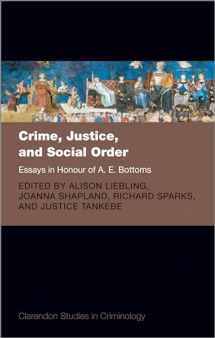
Crime, Justice, and Social Order: Essays in Honour of A. E. Bottoms (Clarendon Studies in Criminology)
Book details
Summary
Description
To honour the extraordinary contribution of Professor Anthony Edward Bottoms to criminology and criminal justice, leading criminologists and penal scholars have been asked to contribute original essays on the wide range of areas in which he has written. The book starts by reflecting on the depth and breadth of Anthony's contribution and his melding of perspectives from moral philosophy, social theory, empirical social science research, and criminal justice.
This is no ordinary collection, because it also contains a major essay by Anthony Bottoms, on Criminology and 'positive morality', reflecting on social order and social norms. In similar vein, Jonathan Jacobs approaches criminology from a moral philosophical viewpoint, whilst Ian Loader and Richard Sparks ponder social theory and contemporary criminology. Topically, Peter Neyroud reflects on evidence-based practice and the process of trying to do experiments in relation to policing.
In the second section of the book on Crime, Justice, and Communities, Loraine Gelsthorpe reminds us that justice is about people, in considering the treatment of women in community justice. Joanna Shapland draws parallels between the process of desistance from crime and the potential role of restorative justice in affecting offenders' journeys. P.-O. Wikstrom reflects on the social ecology of crime, whilst Antje Du Bois Pedain considers the theoretical and practical challenges of sentencing constructively.
Finally, the book turns to Anthony Bottoms' major interest in punishment and penal order. David Garland puts penal populism under the microscope, whilst Alison Liebling explores the empirical evidence for theories of penal legitimacy. Mike Nellis looks back at the use of the creative arts in prisons in Scotland's Barlinnie Unit, whilst Justice Tankebe explores police legitimacy.


We would LOVE it if you could help us and other readers by reviewing the book
Book review



